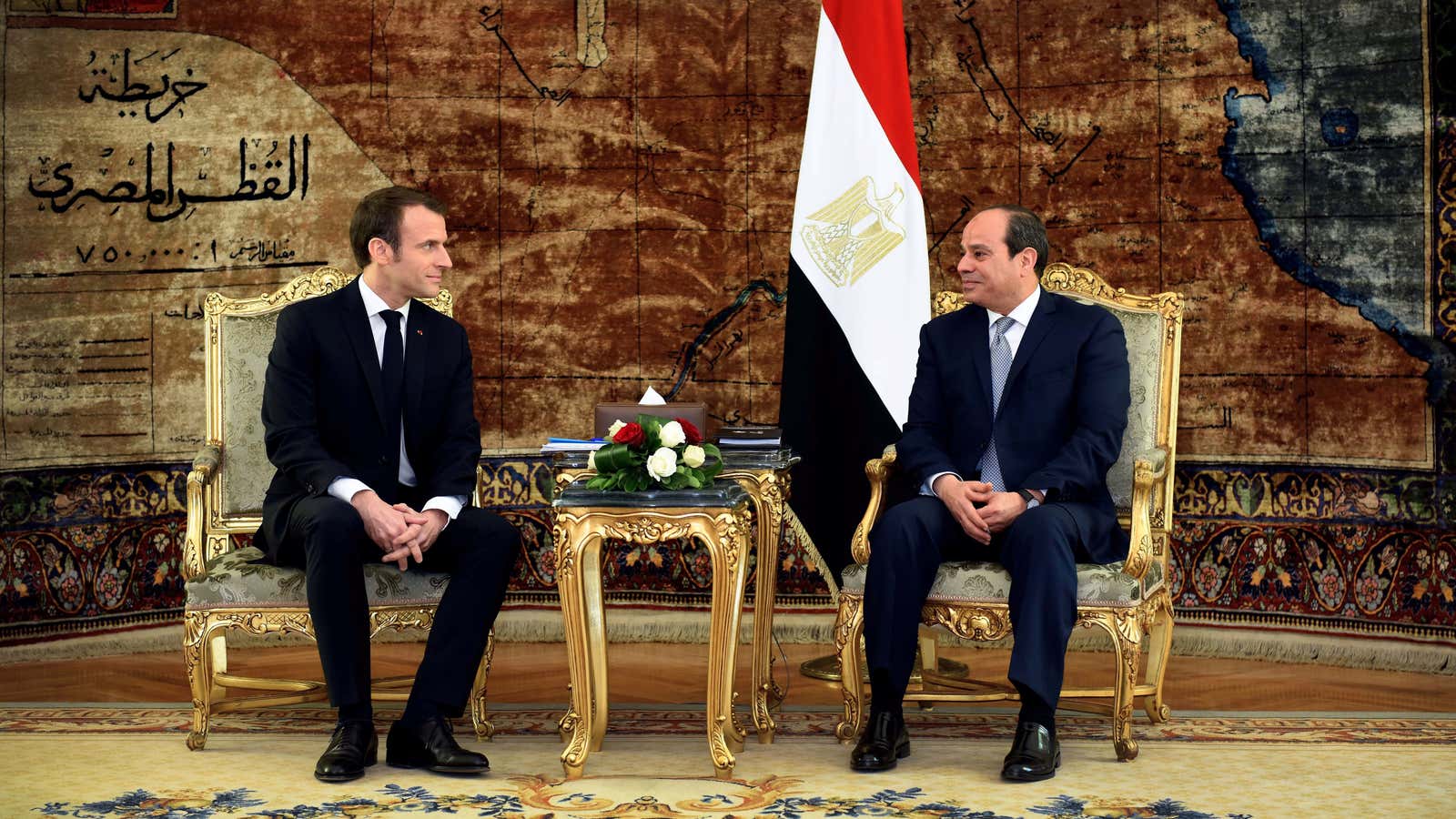On his first visit to Egypt that took in archaeological sites in Luxor and a cathedral bombed by Islamic State, French president Emmanuel Macron’s remarks to his counterpart Abdel Fattah el Sisi about the country’s deteriorating human rights situation on live television saw both leaders temporarily drop their diplomatic masks.
Macron, under pressure from human rights groups in France before his visit, pointed to the continued imprisonment of bloggers, journalists and activists tarnishing Egypt’s reputation internationally in a televised press conference with Sisi this week, as part of his three-day tour.
In earlier remarks, Macron asserted Egypt’s current human rights record was worse than under Mubarak a particulary biting comment as it coincided with the eighth anniversary of the 18-day revolution that unseated the long-time autocrat.
A French journalist picked up on Macron’s point asking Sisi about their continued imprisonment to which he replied, “Egypt won’t rise up with bloggers. It will advance through the work, effort and perseverance of its sons”.
“You’re asking me about the rights of bloggers and I am asking you what about the millions of unemployed graduates. I have a million finishing university every year. How will I find jobs for them? What am I supposed to do? Someone should tell me what should I do”, Sisi added.
Alluding to his crackdown on dissent, Sisi reiterated “I am here as president with the will of the people. If that will isn’t there I would leave my position immediately. I am saying this so the whole world would know”.
As well as independent bloggers, under Sisi, the Egyptian government has had a long-running contentious relationship with Qatari broadcaster Al Jazeera and some other broadcasters from rival Muslim countries. The government has jailed several of Al Jazeera journalists in the last couple of years including Mahmoud Hussein, who has already spent two years in prison without charges, trial or conviction. The government blames these news organizations for spreading false news.
Egyptian talk shows and lawmakers have been raising the prospect of constitutional amendments on the horizon allowing Sisi to stay in power beyond the mandated eight years. Mubarak, one of Africa’s longest reigning dictators, was president for thirty years.
Earlier this month, Sisi denied that there are any political prisoners in a botched sit-down with 60 minutes on the CBS network, which was originally recorded in September last year. The program revealed that Egyptian officials had pressured the producers not to release footage of the interview.
Human rights groups maintain that there are over 40,000 prisoners of different political stripes including famed blogger Alaa Abdel Fattah who is due to be released in about 50 days and Amal Fathy, a feminist activist who was sentenced to two years in prison for speaking up about sexual harassment on Facebook.
The renewed pressure to discuss human rights comes amid continued purchases by Sisi for French Rafale jets. Macron’s delegation included the head of Dassault Aviation, the manufacturer of the fighter jets, but the delivery of 12 jets on top of 24 already in stock was not finalized on this trip. France’s arms sales to Egypt jumped to €1.3 billion in 2016 from just 39.6 million euros in 2010. Egypt is the third largest arms importer in the world.
The timing for Macron’s visit was auspicious besides being on the week of the eighth anniversary of the revolution. Sudanese president Omar al Bashir, who has been facing unprecedented protests to his three decade rule that he dismissed as imitations of the Arab Spring, was also in Egypt during the same time shoring up support from Sisi.
Sign up to the Quartz Africa Weekly Brief here for news and analysis on African business, tech and innovation in your inbox
